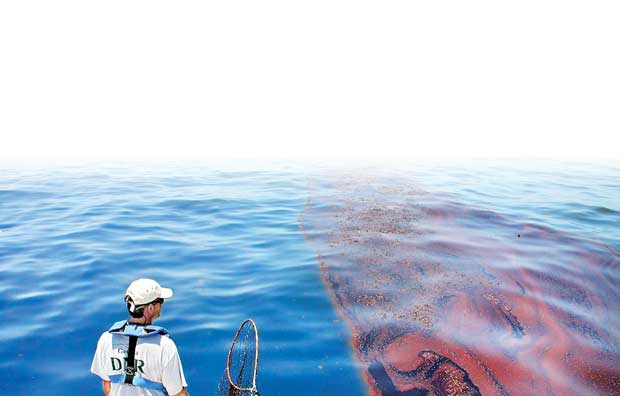Reply To:
Name - Reply Comment
Last Updated : 2024-04-23 15:09:00
 The world appears to be blind to the dreadful consequences of polluting the oceans because of the mistaken belief that the oceans, vast as they are, can absorb anything and still be pristine, laments Admiral Dr. Jayanath Colombage, a former Commander of the Sri Lankan Navy, who is now Director of the Indo-Lanka Initiatives (ILI).
The world appears to be blind to the dreadful consequences of polluting the oceans because of the mistaken belief that the oceans, vast as they are, can absorb anything and still be pristine, laments Admiral Dr. Jayanath Colombage, a former Commander of the Sri Lankan Navy, who is now Director of the Indo-Lanka Initiatives (ILI).
In a paper presented at the SAGAR Dialogue held at Goa in India on October 12, the Lankan sailor turned academic says that the world will be forced to depend even more on the oceans than now, because less and less land will be available for use in the coming years.
But galloping industrialisation and increasing traffic in the seas due to trading are polluting the oceans also. That will have deleterious economic and environmental consequences, unless urgent steps are taken to fight pollution in the high seas as well as on land, Colombage warns.
Oceans as industrial production centres
The Admiral predicts that industrial activities in the ocean will increase with new industries such as renewable energy, sea bed mining, blue bio-technology, blue technology and remediation and restoration of the ocean.
“All these activities will add more pollutants to the oceans, unless strict regulatory measures are implemented, ”Colombage says.
And the oceans’ potential as an exploitable economic asset is vast and still unfathomed. The oceans cover well over 70% of the earth, but 95% of the underwater world remains unexploited accordingly the Admiral says quoting Dr. P. K. Terney (Potential Challenges and Opportunities of Marine Biodiversity and Ecosystems in Sri Lanka 2017).
Given the presence of a multitude of actors such as State players, law enforcement agencies, researchers, exploiters, smugglers of humans, narcotics and guns, IUU fishers and tourists, the oceans need to be managed,” Colombage adds.
Deep sea eco systems, covering nearly 62% the globe, are yet to be discovered. And this area may contain more than 10 million unknown species, Terney adds.
 The ocean is the major mode of transportation for 90% of goods in international trade. As per UN Sustainable Development Goals (SDG) 14, the oceans serve as the largest source of protein, with more than three billion people depending on the oceans for their primary source of protein and over three billion people depend on marine and coastal biodiversity for their livelihoods.
The ocean is the major mode of transportation for 90% of goods in international trade. As per UN Sustainable Development Goals (SDG) 14, the oceans serve as the largest source of protein, with more than three billion people depending on the oceans for their primary source of protein and over three billion people depend on marine and coastal biodiversity for their livelihoods.
Colombage quotes T. Dhamarathna’s 2017 paper entitled: Potential Challenges and Opportunities of Marine Biodiversity and Ecosystems in Sri Lanka, to point out that in the Indian Ocean sea bed, there are heavy minerals such as gem minerals, Ilmenite, Rutile, Zircon, Monazite, Manganese nodules, Phosphates nodules and crude oil and gas which should be available in commercially viable exploitation quantities in the Indian Ocean Region (IOR).
“And given the presence of a multitude of actors such as State players, law enforcement agencies, researchers, exploiters, smugglers of humans, narcotics and guns, IUU fishers and tourists, the oceans need to be managed,” Colombage adds.
Pollution
There can be ocean-based pollution too. These includes ships accidents (oil and hazardous matter), Explorations (Oil and Suspended matter) and Dumping (Oil and Garbage).
The UN SDG 14 indicates that as much as 40% of world oceans are heavily affected by human activities, including pollution, depleted fisheries, and loss of coastal habitats, Colombage says
As per a report of the National Oceanic and Atmospheric Administrative Service of US Department of Commerce, 80% of pollution to marine environment comes from the land. Land based pollutants can come from agriculture (fertiliser and pesticide), urbanisation (Disposal sewage and solid waste), industries (effluents and solid waste discharge) dirt, aquaculture projects, and oil from motor vehicles.
Thousands of tons of plastic are dumped into the ocean on a daily basis and plastic is one of the most dangerous pollutants found in the ocean. It is harmful for the environment as it does not breakdown easily and often it is considered as food by marine animals.
Trash and waste dumped into the ocean can be washed up hundreds of miles away. Dumping of toxic waste, chemical waste and radioactive waste are also heavy contributors to ocean pollution.
 Chemicals can enter the ocean through various industries, as well as accidents.
Chemicals can enter the ocean through various industries, as well as accidents.
All these pollutants can kill large numbers of sea creatures and birds and impact the entire marine eco system. It can impact the reproduction cycle of the marine animals and behavioural changes, finally causing death, the Admiral points out.
This has led to a gradual loss in marine life and an increase in the number of endangered species. Littering causes pollution in the ocean, which also causes a substantial loss of life beneath the seas.
“Marine creatures, specially the smaller ones, can absorb these chemicals as part of their food and then enter the food sector on land,” he asserts.
Noise pollution in sea
The seas may seem to be quiet except during storms, but there is actually much too much noise in its depths for the marine life there.
“Marine life is always disturbed and threatened by a combination of industrial noise, mainly from shipping, seismic exploration and use of air gun and naval sonar. Marine scientist and bio-acoustics expert Clark terms this phenomenon as acoustical bleaching of the oceans, a human-made cacophony that can tear apart the social networks of whales, adversely affecting survival and reproductive success,” Colambage says.
According to Clark, whale feeding grounds and migratory routes are then disturbed and they lose breeding opportunity and choices. Further, these loud noises can impact the communication ability of marine mammals which are capable of echolocation.
The sound from seismic air gun explosions, which are mainly used in oil and gas explorations travels through the ocean and it changes from a big bang into a big fuzzy ball of reverberating noise. These bubbles produce a pressure that expand and contract, generating an immense amount of acoustic energy,” Colombage says, quoting from R. Schiffman’s 2016 paper entitled: “How Ocean Noise Pollution Wreaks Havoc on Marine Life,” in Yale Environment360.
But the good news is that technologies are being developed to drastically reduce noise from ships and geological surveying.
“These technological advances may produce quieter ships which are the main contributor to noise pollution. But there should also be control over the locations, duration and the number of seismic air guns used in explorations,” Colombage adds.
Need to go beyond EEZs
However, nations are basically interested only in maintaining their Exclusive Economic Zones (EEZ). The result is that the ocean at large, the common ocean as it were, is nobody’s baby – uncared for and left to be misused and unprotected.
“There is a need to look beyond state jurisdictions of territorial and EEZs and to treat the oceans as a maritime common,” Colombage pleads.


Add comment
Comments will be edited (grammar, spelling and slang) and authorized at the discretion of Daily Mirror online. The website also has the right not to publish selected comments.
Reply To:
Name - Reply Comment
On March 26, a couple arriving from Thailand was arrested with 88 live animal
According to villagers from Naula-Moragolla out of 105 families 80 can afford
Is the situation in Sri Lanka so grim that locals harbour hope that they coul
A recent post on social media revealed that three purple-faced langurs near t

21 Apr 2024